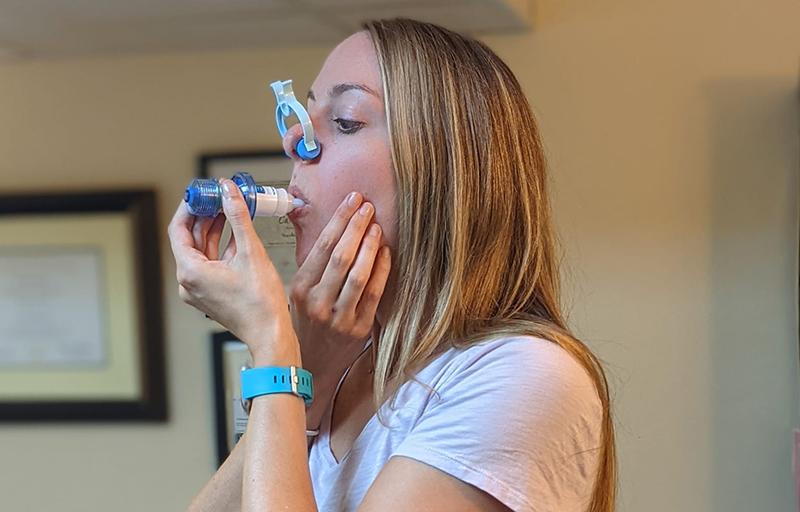Assessment and Treatment
Our practice has extensive experience treating voice, Upper Airway Breathing, and swallowing difficulties.
Therapy sessions are available both in the office and online via a patient-protected telehealth format for those located in the state of Florida.
Your first appointment at South Tampa Voice Therapy is a 1-hour evaluation. We prefer that your evaluation appointment is in the office, however, some assessments can be performed online. Endoscopic voice, upper airway and swallowing assessments are in-office appointments. Subsequent therapy sessions range from 30-45 minutes. Therapy sessions can be in the office, online via telehealth, or at an agreed upon location.
Voice Assessment and Treatment
The therapists at STVT bring over 25 years of combined experience in treating voice issues (dysphonia). Your voice is a vital aspect of your personality and identity, often serving as a key to professional opportunities. We carefully analyze the cause of your voice issue, its effects on your quality of life, and how to effectively support your rehabilitation. We collaborate closely with your physician(s) and care providers to deliver expert, personalized care.
During your initial evaluation, we will use a scope to directly visualize your vocal cords through a procedure called videostroboscopy. We’ll discuss the results with you during your appointment and work closely with your physician(s) to determine the most suitable treatment plan.
We frequently work with occupational voice users, including teachers, customer service representatives, and others who depend on their voice for their livelihood.
Individuals seeking voice care may also include those managing neurological conditions like Parkinson’s disease, laryngeal dystonia, and essential tremor.
We collaborate closely with voice performers including singers, voice-over artists, and actors to help rehabilitate their vocal instrument.
We understand the emotional impact of voice issues and are committed to working with you to achieve efficient improvements.
Depending on the specific issue and clinical situation, you can expect to attend an average of 6 therapy sessions.
Gender Affirming Voice Assessment and Treatment
Individuals may seek voice care when their voice and communication style do not align with their gender or identity. As allies to the LGBTQ+ community, the therapists at STVT collaborate with individuals to adjust their speech, voice, and communication style to better affirm their identity and sense of self.
During the first appointment, we directly visualize the vocal cords to assess vocal health, understand an individual’s specific goals, and initiate voice therapy strategies for voice modification. We support individuals during their journey to help affirm their true selves. The typical intervention consists of approximately 9 sessions over 12 weeks, though this may vary for each individual.
Swallowing Assessment and treatment
Physicians and other healthcare professionals frequently refer patients for a swallow study due to difficulties with swallowing (dysphagia), respiratory issues, and unintended weight loss. At STVT, we conduct a thorough assessment of your swallowing function using a procedure called Fiberoptic Endoscopic Evaluation of Swallowing (FEES).
During the FEES procedure, a thin, flexible scope is inserted through your nose and placed in your throat while you swallow different foods and liquids. You are encouraged to bring any foods that you find particularly difficult to swallow and we will include them in the assessment.
Various conditions can lead to swallowing difficulties, including but not limited to neurological disorders (such as stroke and Parkinson’s disease), cancer, reflux, dementia, and general frailty associated with advanced aging.
We recognize the seriousness of swallowing difficulties and work diligently with you and your healthcare providers to enhance your swallowing safety, nutritional status, and quality of life.
Therapy is generally conducted weekly over a three-month period. However, individuals coping with a progressive degenerative neurological disease may need ongoing intervention to preserve function.
Upper Airway Assessment and Treatment
Chronic Cough
Physicians and other healthcare professionals refer patients for evaluation and treatment of chronic, habitual coughing. This persistent cough can be disruptive, exhausting, and socially difficult, with some patients suffering for months or even years without relief. Often, this occurs after extensive medical evaluations and trying various medications and cough drops. We understand the physical and emotional impact of chronic coughing and collaborate with you and your physicians to address it. Our approach includes behavioral interventions designed to alter the muscle memory associated with coughing, usually through a brief course of therapy consisting of approximately three-four visits over 6 to 8 weeks.
Inducible Laryngeal Obstruction (ILO)
Physicians and other healthcare professionals often refer patients for evaluation and treatment of breathing conditions that are not directly related to the lungs. This is called Inducible Laryngeal Obstruction (ILO), formerly called Vocal Cord Dysfunction (VCD). The referral for speech pathology assessment occurs after thorough medical assessment and use of various inhalers and medications without significant improvement. These conditions impact the throat muscles, making breathing difficult and often frightening.
The first appointment includes a comprehensive history intake, direct visualization of your throat muscles using a scope, and the initiation of treatment to facilitate easier breathing. Treatment focuses on modifying muscle memory to ensure proper throat muscle movement during breathing. Therapy typically consists of three-four visits over 6-8 weeks.
Exercise-Induced Laryngeal Obstruction (EILO)
In some cases, breathing difficulties are triggered by exercise, particularly in competitive adolescent athletes. These athletes often consult multiple specialists, including pulmonologists, ENTs, allergists, cardiologists, and primary care physicians before being referred to STVT. During the first appointment, we attempt to provoke breathing difficulties through exercise and use a scope to directly visualize the throat muscles. This process aids in the accurate diagnosis of the condition. Treatment will begin during this initial visit to help improve breathing during exercise.
Treatment usually takes place outside the office, in locations where the adolescent can exercise, such as the track, pool, gym, or other outdoor spaces. We work with coaches to coordinate treatment sessions that support the recovery process. For patients outside the Tampa Bay area, treatment is available virtually via telehealth. Therapy typically consists of three-four visits over 6-8 weeks.
Speech/Language Assessment and Treatment
The therapists at STVT have extensive experience helping individuals who have experienced changes in their speaking intelligibility (dysarthria) and language functioning (aphasia). These challenges often arise from neurological conditions such as stroke, traumatic brain injury, or Parkinson’s and related disorders. During your initial appointment, we will conduct a comprehensive assessment and develop an intervention plan tailored to your specific difficulties, needs, and preferences.
Therapy is typically scheduled one to two times a week for 12 weeks, but may be extended to help maintain function for individuals living with a progressive neurological condition.
Cognitive Assessment and Treatment
Physicians and other healthcare professionals may refer patients experiencing cognitive difficulties, which can include memory loss, issues with attention, concentration, understanding, following instructions, reasoning, and problem-solving. These challenges may arise from neurological conditions such as dementia or from a traumatic brain injury. Intervention is tailored to each individual and takes into account their living environment, as well as the roles of family and care partners.
Therapy is typically scheduled one to two times a week for 12 weeks, but may be extended to help maintain function for individuals living with a progressive neurological condition.







